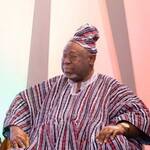As Ghana gears up for the upcoming December elections, political parties are under the spotlight for their leadership choices, with a significant focus on gender representation.
Women constitute 51% of the electorate, making their voices pivotal in shaping the political landscape.
The New Patriotic Party (NPP), in particular, faces crucial decisions regarding its leadership structure, with the potential selection of a female running mate being a progressive move towards gender equality and inclusive governance.
If the NPP opts for a female running mate, it would align Ghana with numerous countries that have embraced female leaders at the highest levels of government.
Notable examples of countries with female presidents include Dominica (Sylvanie Burton), Barbados (Sandra Mason), Georgia (Salome Zourabichvili), Greece (Katerina Sakellaropoulou), and Honduras (Xiomara Castro).
This list extends to countries like India (Droupadi Murmu), Taiwan (Tsai Ing-wen), and Trinidad and Tobago (Christine Kangaloo), among others.
Africa has also seen a wave of female leadership, with Joyce Banda in Malawi, Ellen Johnson Sirleaf in Liberia, Ameenah Gurib-Fakim in Mauritius, Sahle-Work Zewde in Ethiopia, and Elisabeth Domitien in the Central African Republic.
Female vice-presidents and prime ministers have served in nations such as The Gambia, Tanzania, Zambia, Liberia, Burundi, Rwanda, Senegal, São Tomé and Príncipe, Togo, Uganda, Mozambique, Mali, Namibia, and DR Congo.
The global trend towards female leadership underscores the potential for Ghana to embrace gender diversity at the highest echelons of power.
Advocates for a female running mate argue that increasing women’s representation in political leadership is crucial for Africa’s socioeconomic development.
They highlight that women in leadership roles can offer new perspectives and solutions, essential for combating poverty and disease.
Despite significant strides in various professional fields, including education, sports, business, politics, fashion, and music, Ghana’s political arena still presents challenges for women.
However, the examples set by other African nations show that gender diversity in leadership is achievable and beneficial.
The call for a female running mate in Ghana is not merely about symbolism.
It is rooted in a broader agenda of women’s empowerment and equitable representation.
As the NPP considers its options, the potential selection of a female running mate could signal a transformative step towards inclusive governance, reflecting the changing dynamics and aspirations of Ghanaian society.
In the lead-up to the December elections, the decisions made by political parties, particularly the NPP, regarding their leadership structures will be closely watched.
These choices have the potential to reshape Ghana’s political landscape, setting a precedent for future elections and the country’s governance model.




